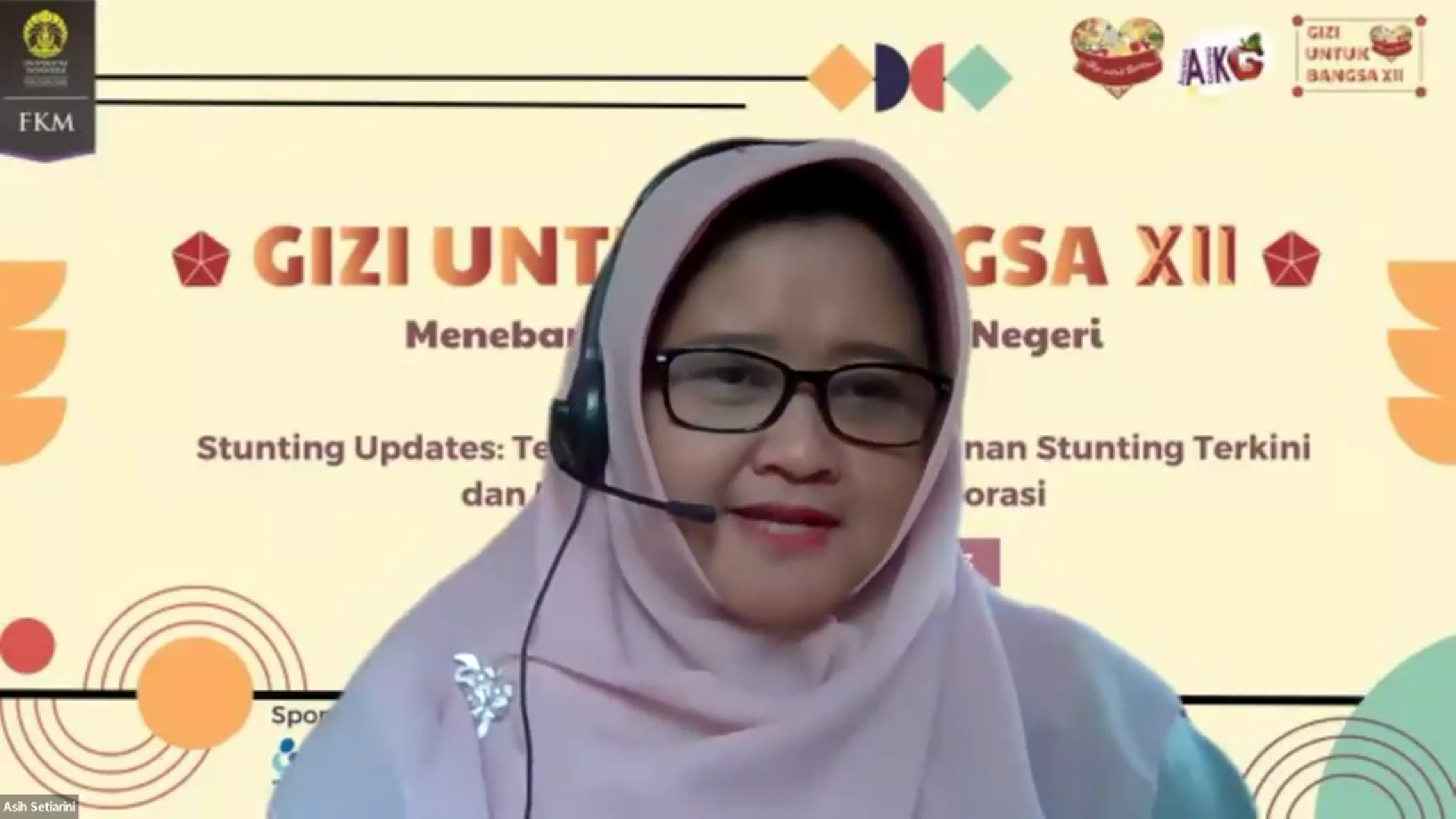Sunday, September 17, 2023, the Department of Nutrition, Faculty of Public Health (FPH) Universitas Indonesia (UI) held the XII Nutrition for the Nation Seminar with the theme “Review of Current Stunting Handling Policies and Strengthening Collaboration Potential”. This seminar is an annual activity which aims to disseminate the research results of nutrition study program students.

Present as keynote speaker, Prof. Dr. Dr. Damayanti Rusli Sjarif, Sp.A(K), Ph.D. Prof. Damayanti spoke about “Scientific Evidence-Based Strategy for Accelerating Stunting Reduction through Animal Protein Consumption and a Tiered Referral System for Posyandu-Puskesmas-RSUD”. Currently, 148 million children worldwide still experience stunting with 52% of cases in Asia. Even though the prevalence of stunting in Indonesia has fallen to 21.6% in 2022, stunting remains a serious problem because it can affect children’s cognitive and metabolism. Even if they try to treat it, the cognitive and metabolic processes of children who have experienced stunting will not return to normal. For this reason, efforts are needed to accelerate the handling of stunting with the focus on prevention. “Interventions to prevent stunting can be carried out in the prenatal and postnatal phases. “Prenatal interventions are carried out on pregnant women, while postnatal interventions are carried out on toddlers at risk of stunting and toddlers who are already stunted,” said Prof. Damayanti. Primary prevention of stunting can be carried out by families and communities at posyandu, secondary prevention by health workers at community health centers, while tertiary prevention can be carried out by health workers at regional general hospitals (RSUD). “If all parties collaborate well, we can reduce the prevalence of stunting significantly. significant,”.

The XII Nutrition for the Nation Seminar also presented three panelists with Prof. Dr. Drg. Sandra Fikawati, M.P.H., Professor at FPH UI and Deputy Chair of the Center for Nutrition and Health Studies at FPH UI, as the first panelist. “Currently, the Indonesian Ministry of Health already has 11 specific interventions to reduce stunting. However, there have been no efforts to educate and promote the provision of animal protein to children. “In fact, animal protein has been proven to be the key to successfully treating stunting,” said Prof. Drg. Sandra in her presentation with the theme “Family Assistance in Optimizing the First 1000 Days of Life (HPK) Through Consuming Animal Protein”. Animal protein itself is rich in macro and micronutrients that are difficult to find in other types of food. For this reason, the government must strive to provide nutritious food, especially animal protein, that is affordable for all levels of society. “Families also have an important role in preventing stunting. The nutritional status of pregnant women and lactating mothers is crucial for children. Apart from mothers, fathers also have an important role in preventing stunting, such as ensuring adequate nutrition for all family members, providing emotional support, implementing a healthy lifestyle, and creating a comfortable family life.”

Chair of the Center for Nutrition and Health Studies, FPH UI, Ir. Ahmad Syafiq, M.Sc., Ph.D., as the second panelist then explained about “Community Empowerment in Stunting Prevention”. Currently, there are many programs that aim to prevent stunting, but have not used an empowerment approach. To make sustainable changes, people must be invited to participate in changing their own conditions. The community must be able to mobilize resources, could assess critically, be able to partner and form coalitions, and be able to carry out program management. “An empowerment approach must be taken so that the community does not continue to be an object but can overcome stunting independently. “It will be faster and more sustainable if the aim is prevention and promotion,” said Ir. Ahmad Syafiq. Public health nutrition has a very important role in carrying out an empowerment approach to complement existing programs.

The final material, namely “Multi-party Collaboration in Implementing Programs that Support the Acceleration of Stunting Reduction in the Tanjung Priok District Area” was presented by dr. Sahruna, Head of the Tanjung Priok District Health Center, North Jakarta. “Stunting has more than one determinant. “In each determinant there is a role for the health sector and other sectors,” said Dr. Sahruna. The roadmap for preventing and handling stunting in Tanjung Priok starts with education for teenagers, health checks and counseling for prospective brides and grooms, services, and assistance for pregnant and breastfeeding mothers, as well as monitoring and assistance for babies and toddlers. In its implementation, the Tanjung Priok Community Health Center also collaborates with the National Stunting Task Force.
Apart from seminars, Nutrition for the Nation XII also held a symposium on five major topics, namely stunting and its causes, anemia and blood supplement tablets; malnutrition in toddlers and deviant eating behavior; literacy, media and nutritional product innovation and nutritional intake for toddlers; nutritional status and non-communicable diseases and dietary behavior; choosing food and drinks with their impact on health and consumption patterns of sugar, salt and fat. It is hoped that the seminar and dissemination of research results at the XII Nutrition for the Nation symposium can benefit the wider community, even at the level of policy determination. “Hopefully the slogan of Nutrition for the Nation, namely ‘Spreading Knowledge, Building the Nation’ can be realized through today’s seminar and symposium activities,” said Deputy Dean for Education, Research and Student Affairs, FPH UI, Dr. Ir. Asih Setiarini, M.Sc., in his speech. (WR)


